Values in Applied Geography
At each stage of the research process the applied geographer is faced with a number of methodological and ethical questions. Decisions are required on defining the nature of the problem, its magnitude, who is affected and in what ways, as well as on the best means of addressing the problem. All of these require value judgments on, for example, the […]
The Value of Applied Geography
A fundamental question for those working within the framework of applied geography concerns the value of a problem oriented approach. We have examined this issue already in our discussions of useful knowledge and the relationship between pure and applied research but we return to it here to address the specific critique of applied geography that has emanated from Marxist theorists. While the […]

The Relationship between Pure and Applied Research
Applied research in any discipline is best understood in contrast with basic, or pure, research. For some commentators basic research in geography aims to develop new theory and methods that help explain the processes through which the spatial organization of physical or human environments evolves. In contrast, applied research uses existing geographic theory or techniques to understand and solve specific […]
The Concept of Useful Knowledge
The concept of useful knowledge is of central importance for applied geography but is problematic for some practicing geographers. Those who do not see themselves as applied geographers may interpret the concept as indicating a corollary in the shape of geographical research that is less useful or even useless. This would be a misinterpretation. The concept of useful […]
Applied Geography
The rationale underlying applied geography is based on the particular philosophy of relevance or social usefulness that focuses on the application of geographical knowledge and skills to advance the resolution of realworld social, economic, and environmental problems. Rather than being considered as a 'subarea' of geography, (akin to economic, social, or historical geography), applied geography refers to an 'approach' […]
Other Apartheids
There have been numerous claims of other apartheids around the world, in countries as diverse as Northern Ireland, the USA, Israel/Palestine, and Brazil. If we accept the United Nations definition of apartheid used at the start of this article, it is debatable whether these can be considered apartheid equivalents. What constitutes institutionalized racial segregation and discrimination? There is indeed segregation within […]
Post-Apartheid
The end of apartheid as a political force heralded the start of the post apartheid era. However, post apartheid South Africa is in many ways still attempting to liberate itself from the legacy of apartheid and precursors. The multiscalar spatial reach of apartheid impacted upon every area of life for individuals and communities in a complex, interlinked manner. Therefore, the success […]
Towards Ending Apartheid
Although apartheid officially ended in 1994, when South Africa held its first democratic election, it had been in a period of transition for a number of years, possibly as far back as the early 1970s. Reasons for the decline of apartheid can be broadly divided into agency based and structure based arguments. Agency based arguments reflect the popular narratives of […]
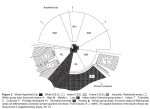
The Nature of Apartheid
The degree of segregation in existence before 1948 has led some to argue that apartheid was simply a continuation of what was already in process. However, the election of the National Party brought a far more comprehensive kind of segregation to what had gone before. Between 1948 and 1951 a series of acts were passed to lay the foundation […]

From Segregation to Apartheid
Many of the building blocks of apartheid were in existence by the time the National Party was elected to power in 1948, leading some commentators to stress the continuity from pre apartheid to apartheid, from de facto to de jure segregation. The Union of South Africa was formed in 1910 from the British Colonies of Natal and the […]
Apartheid/Post-Apartheid
The apartheid era in South Africa existed for 46 years, between 1948 and 1994. However, its historical reach can be traced considerably further back into the country's history and forward into present lived experiences. Apartheid (literally: 'state of being apart' in Afrikaans) was perhaps most clearly defined in the 1985 United Nations International Convention Against Apartheid in Sport as, ''a system of […]

Case Study: Edward Hopper’s New York
Great art is the outward expression of an inner life in the artist, and this inner life will result in his [sic] personal vision of the world. Edward Hopper, 1953 (quoted in Hobbs, 1987: 64) Edward Hopper (1882–1967), an artist with a huge posthumous following (a traveling retrospective of his work in the summer of 2004 drew massive crowds to galleries […]

Dislodging the Good Life, Disrupting the Rural
Industrialization proved to be the force that dislodged widespread pro urbanism. The good city for the good life morphed into Frederick Engels' Manchester, Henry Mayhew's London, and Upton Sinclair's Chicago, to name but a few representations of the industrial city as dirty, dark, crowded, anonymous, threatening to the weak, a jungle of brick, stone, and smoke. These representations were powerful in […]
Origins: The Good Life
In order to understand where anti-urban sentiment came from, we must appropriately invert one of the key principles of the natural sciences (especially geology), uniformitarianism, often summed with the statement: 'the present is the key to the past'. For our purposes, the past is the key to the present, and therefore we must acknowledge the widespread and deeply entrenched […]

Introduction: 100% Urban Proof
In early 2007 Nissan launched a new model of sport utility vehicle (SUV), the Qashqai. The massive in your face marketing campaign described the Qashqai as ''100% Urban Proof '' – posters were designed showing a triumphant tank like vehicle protected from gritty looking streets, with the backdrop of walls plastered in menacing graffiti (Figure 1). The website takes the […]
Anti-Urbanism
Introduction: 100% Urban Proof Origins: The Good Life Dislodging the Good Life, Disrupting the Rural Case Study: Edward Hopper's New York
Critique of Anti-Geopolitics
The notion of anti-geopolitics is a very recent one, barely 10 years old. Some of its associated ideas have attracted analytical attention, such as the anti-geopolitical eye in feminist geopolitics. The term anti-geopolitics in itself, however, has not found widespread application to date. Its use has mainly been restricted to a handful of writers from the Anglo-American critical geopolitics perspective. It has […]
Anti-Geopolitics as Perspective
Geopolitics has always been a contentious form of knowledge and practice, and there have been many critiques to dominant geopolitical reasoning. These range from the orthodox Marxism of the German communist Karl Wittfogel in the 1920s to the poststructuralist interventions of the critical geopolitics school of the 1980s. More recently, feminist geographers have called for a feminist geopolitics. They expose the […]
Anti-Geopolitics as (Radical) Politics
The policies and strategies of empires, colonial powers, dictatorships, and states have rarely gone unchallenged by those who have been subjects to various degrees of domination and exploitation. Quite on the contrary, dominating power has almost always faced resistance from various forms of counter hegemonic struggles. Proponents of anti-geopolitics focus on the latter as enacting a geopolitics from below that emanates from subaltern […]
Origin and Context of the Term Anti-Geopolitics
The term anti-geopolitics emerged in the English speaking literature in the mid 1990s. Although the term is briefly mentioned by O Tuathail in 1996 (then spelt without hyphen as antigeopolitics), it was only in 1998 that it was conceptually developed in the first edition of the Geopolitics Reader, edited by O Tuathail, Dalby and Routledge. Subsequently, Routledge has published slightly edited versions […]
Anti-Geopolitics
Origin and Context of the Term Anti-Geopolitics Anti-Geopolitics as (Radical) Politics Anti-Geopolitics as Perspective Critique of Anti-Geopolitics
Geoarchaeology, Environmental History, and Causality
A very different intersection between anthropology and geography came about in the form of geoarchaeology, another integrative approach. Although geoscience applications to problems of dating, environmental reconstruction, and spatial organization in archaeology are common (mainly as 'archaeological geology'), and rapidly gaining in popularity, direct attention to the nature of the archaeological record is not. That record is a proxy for human […]
Cultural Ecology as a Reunion
In the wake of New Guinea, anthropologists and geographers began to rediscover common ground in what was then called cultural ecology. This approach concentrated on processes rather than material culture – subsistence, work, reproduction, and resource use – and their interrelations – as embedded in the rules and values of a particular society. The configurations could be functional, behavioral, […]
Anthropology and the Berkeley Tradition
Kroeber, who became professor of anthropology at Berkeley in 1919, was instrumental in bringing Carl Sauer (1889–1975) to the University of California, to found its department of geography in 1923. Yet Sauer's early signature publication, The Morphology of Landscape (1925), focused on an ongoing discourse in German geography and does not yet reveal the close connection that had developed between Sauer […]
The Bridge between Human Geography and Anthropology
A major figure in this transition was Friedrich Ratzel (1844–1904), trained as a zoologist and an admirer of Darwin. He was appointed to the chair of geography at Leipzig (1886) but carried out his most influential work in what today is anthropology. Traveling widely, he worked as an itinerant reporter in the USA (1872–75), publishing Urban and Cultural Images of North […]
An Attenuated Separation
Interdisciplinary relationships are a reminder that traditional university disciplines are historical constructs that do not necessarily promote innovative teaching and research. Some disciplines have long shared a measure of organic integrity, but the 'newer' social sciences did not. Geography, together with anthropology, sociology, and political science, occupied a poorly articulated middle ground between the natural sciences, history or philosophy, and language […]
Anthropology and Human Geography
An Attenuated Separation The Bridge between Human Geography and Anthropology Anthropology and the Berkeley Tradition Cultural Ecology as a Reunion Geoarchaeology, Environmental History, and Causality
Political Impact and Deterministic Content of Ratzel’s Geography
Against the background of such statements most commentators, after the end of World War II and up until today, have come to think of Ratzel's geography in rather ambivalent terms. While the central role Ratzel played for the development of the discipline is mostly recognized, his anthropogeography has been criticized for being deeply environmental deterministic. Ratzel, so the general opinion, […]
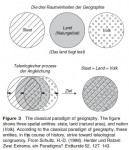
Anthropogeography as Imperialist Transformation of the Classical Paradigm of Geography
It is against the background of the competing geographical imaginations that Hans Dietrich Schultz sees a ''cycle of growth and defeat, of progress and collapse'' at work in Ratzel's writings (Schultz, 1998: p. 140). Since the surface of the Earth is limited, the natural impulse of growth necessarily leads to a form of spatial implosion which, in turn, represents the […]

Competing Geographical Imaginations
Ratzel argued that the state as spatial organism 'naturally' seeks to grow beyond a given area. Due to an increase in population which he regards as being ultimately dictated by the laws of nature, the space need of a state organism would grow. The resulting tendency of the state to require – and acquire – new territory is a […]
Darwinian Concepts
All of this is not to say, however, that Ratzel's perspective turned geography, in any way, into a social science. Although anthropogeography (re)introduced human aspects into a predominantly physical geography, it firmly rested on a framework of causal explanations, cause–effect relationships, and natural laws characteristic for the sciences of his era. As a consequence, Ratzel was criticized by his […]
Is Geography an Independent Discipline?
Why is Ratzel's geography regarded so central for the development of the discipline? In order to answer this question, an investigation into the broader academic context in which anthropogeography evolved is insightful. During the last third of the nineteenth-century, that is, by the time Ratzel was appointed as an academic geographer in Germany, geography underwent its insti tutionalization as an academic […]
Tracing Anthropogeography in Ratzel’s Work and Life
The first of these publications was a two volume regional geography of the United States, consisting of Physikalische Geographie und Naturcharakter der Vereinigten Staaten von Amerika and Culturgeographie der Vereinigten Staaten von Amerika. While the latter, according to Wolfgang Natter, contained a somewhat 'totalitarian' approach considering ''every side of cultural life in North America'' (Natter, 2004: p. 175), it was not before […]
Friedrich Ratzel
Having published more than 1200 papers and books, not including book reviews, Ratzel represents an exceptional academic and a rather abundant writer. A big part of his oeuvre dates back to his earlier years when he worked as a journalist for the Ko?lnische Zeitung. In order to help finance his academic education, he had begun to write popular natural scientific reports […]
Anthropogeography (After Ratzel)
Anthropogeography, or the geography of Friedrich Ratzel, is widely acknowledged as the groundwork of human geography. Ratzel (1844–1904), who had studied, among other subjects, zoology in Heidelberg and Jena, was a German pharmacist, zoologist, and journalist. After having traveled over much of Europe as well as of North and Central America, he became established as an academic geographer first in Munich and […]
Antarctica: Conclusion
Today, the prime purpose of the ATS is no longer the containment of the East–West confrontation of the Cold War. Technological developments and steadily expanding economic/commercial interests imply that certain actors are looking to realize economic benefits from the region. So long as human activity in the Antarctic was of a limited scale, science oriented, and perhaps largely under the direct control […]
Growing Focus on Biological Prospecting
Biological prospecting is taking place in the Antarctic, and some Antarctic life forms have already been 'protected' with patents. The US Patent Office database contains more than 300 references to Antarctica and 92 applications for patents that refer to Antarctica, while a similar survey of European Patent Office records contains at least 62 patents that rely on Antarctic biodiversity. The question […]
Imagining Antarctica as a World Park: Regulating Tourism
Managing tourism in extremely scenic but ecologically sensitive Antarctic, whose chief export remains scientific data, has emerged in recent years as one of the key questions facing the ATS, characterized by steep annual increases, diversification, and geographical expansion. The increasing number of tourists visiting specific or select, more accessible, and logistically considered as safe areas on the continent or its surrounding islands […]
Antarctica as a ‘Natural Reserve’ Devoted to Peace and Science: Since the 1990s
Since the 1990s, the Antarctic has increasingly been represented in global ecological terms. The growing body of evidence purporting to link the polar continent to possible global climatic change has been used by scientists and scientific organizations to explain and legitimize their endeavors. Antarctic is being increasingly seen not only as a barometer of global environmental and resource debates but […]
‘Question of Antarctica’ in the United Nations: The Rise and Decline of Alternative Visualization of the Antarctic
The interest of the 'outsiders' in the icy continent arose as early as early 1980s and somewhat in direct proportion to the origins and evolution of minerals issue within the ATS. Malaysia was to emerge as the most vociferous and dissatisfied among the critics of the ATS. The Malaysian position reflected, in part or whole, that of the most of […]
Growing Focus on the Resource Geopolitics: Southern Polar Region during 1970s and 1980s
The 1970s were a landmark in the discursive transformation of the Antarctic. By this time a rather impressive outline of Antarctic resources had emerged as a result of extensive geological and biological research of the region. This was soon filled in by perceptions of the burgeoning population in terms of consumption and depletion of resources in the wake of the […]
Antarctica as a Continent of Science and Peace: 1950s and 1960s
The Antarctic Treaty (cited hereafter as the Treaty), with a preamble and 14 articles, was signed on 1 December 1959 by the representatives of the 12 IGY participating countries – Argentina, Australia, Belgium, Chile, France, Japan, New Zealand, Norway, South Africa, United Kingdom, United States of America, and USSR. It took effect on 23 June 1961. The preamble to the Treaty underlines […]
IGY (1957–58) and the Discursive Transformation of the Antarctic
It was science, especially the IGY held during 1957–58, which transformed Antarctic politics and laid down the groundwork for the Antarctic Treaty of 1959. More than 40 research stations and observatories were established during this period, and thousands of scientists were located on the continent. There was more or less a tacit agreement among the participating countries that political problems regarding the […]
Antarctica in the Cold War Ideological Geopolitics (1950s and 1960s)
The dominant spatial representations of the Antarctic during the 1950s were affected by the Cold War discourses. Earlier on, there were clashes between Britain and Argentina over the issue of territorial ownership. By late 1947, Antarctic affairs assumed immense significance in foreign policy considerations of the US, and the impetus for this shift in focus had more to do […]
Antarctica
With a total area of about 5.5 million square miles (or some 14 million km2) constituting one tenth of the world's land surface, Antarctica is far larger than India and China put together. Right through the nineteenth century and up to World War II, human presence and activity in the Antarctic was rather patchy, both spatially and temporally. Thereafter, and particularly […]
A Shift of Responsibility
Agricultural modernization arguably took the issue of animal welfare out of the traditional moral realm of stewardship and into the domain of science. Empiricism and the scientific method, under the paradigm of agricultural progress, furnished animal science with a refuge from overt and explicit ethical engagement. Although the contested anthropocentrism of Enlightenment thinking contested the moral acceptability of the cruel treatment of […]
Redefining Animal Welfare
It is at this point that the conceptualization of animal welfare shifts from a purely instrumentalist notion, here welfare is equated for all intents and purposes with productive efficiency, to a re animalized notion based upon the physical health needs of the individual (including hunger, acute metabolic disease, discomfort, chronic pain, and exhaustion), its mental well being, and its natural behavior. […]
The Difficulty of Animal Welfare
The notion of farm animal welfare is directly linked, first, to the status of farm animals as chattels and commodities, belonging to and traded by farmers and others as a source of revenue and, second, to the fact that their lives, from birth and before, to death, are almost entirely controlled, adapted, and modified by human actors for the purposes of […]
Animal Welfare, Agricultural
Though arguably not a traditional area of geographical concern, agricultural animal welfare is currently attracting the interest of a growing number of human geographers. The (humanist) social sciences in general have long ignored farm animals, and, one might even claim, all animals, rendering them largely invisible and their agency unaccounted for in the analysis of human society. Yet, geography's relatively recent […]
More-than-Human, or Hybrid, Animal Geographies
Other animal geographies have, in recent years, sought to problematize the use of orthodox social categories in their theoretical and empirical approaches to the spatialities of human – nonhuman relations, encounters, and co productions of spaces. This includes ditching many aspects of political economy approaches whilst holding on to a focus on the wider networks in which animals are engaged and […]
Political-Economic Animal Geographies
Animal geographies that have utilized political economic analyses have mainly been found in rural and agricultural geographies. Such studies have at times focused on the development of certain intensive food production regimes as emblematic of current structures of capitalism. For example, studies have focused on chicken and hog intensive production systems in the USA, amongst other matters. Here, animals were always […]
Sociocultural Animal Geographies: Identities and Place
Much of the focus of sociocultural animal geographies has been on animal roles in construction and ordering of culture and individual human subjects, and wider links between human and animal identities in particular times and places. Some animal geographies have experimentally approached animals as something akin to a marginal social group that emphasizes unequal power relations between animals and people, and […]
New Animal Geographies
Many of the renewed animal geographies that emerged in the mid 1990s sought to put some distance between themselves and cultural ecology and Sauer's cultural geography, though some writers do point to a few continuities with that tradition. Such work emerged out of the new cultural geographies that took more materialist approaches to cultural interactions, post structuralist theories that decentered human […]
Early Cultural Geographies of Animals
In contrast to zoogeographical work, early twentieth century geographies of animals sought to examine how some animal distributions were affected by human groups through animal domestication and introductions of animals into new regions. Studies of animal domestication were rejuvenated by evolutionary theory in the late nineteenth and twentieth centuries – viewing animal domestication as one of the main qualities and practices that […]
Zoogeographies
What became known as zoogeography emerged at a time of unheralded exploration, colonial conquest and Empires, collections of animal and plant specimens to be returned to nations such as Britain and France, trophyhunting as an elite leisure pursuit, alongside, and inimical to, the development of scientific disciplines such as biology, geography, and zoology. As such zoogeography, or regional biogeography, should […]
Histories of Animal Geographies
Animals have long had a presence in geography as a discipline. In the modern period, two closely related approaches characterized a distinct study of animals in geography. The first became known as zoogeography and sought to map evolutionary distributions of animals and was closely allied to what was to become a more physical geographical approach, allied with zoology and the (then) emerging […]
Animal Geographies
Animal geographies might, at first, be thought a misnomer by those coming across the term for the first time. Current geographies of animals are not just about animals; how could they be? Instead, current animal geographies seek to challenge entrenched assumptions about animals in modern societies and in the historical developments of humanities disciplines. Recent animal geographies have […]
What about the Excluded? Critical Stances on the Anglo-American Hegemony Thesis
Critics of the 'Anglo-American hegemony' literature in human geography have built on a theoretical and political position that can be defined as 'post structuralist'. Post structuralist thinking, and notably its radical versions, finds its origins in a variety of intertwined strands of research and reflection, including feminism, postcolonial theory, and cultural studies, which have exerted growing influence during the […]
It Is Not Only a Matter of Publishing: The Issue of Access
The power geometries in academic publishing are not only dependent on 'immaterial' factors such as language, discourse, academic power, and cultural traditions, but also on 'material' access to scientific knowledge and, most notably, to academic journals. Thus, even if we would be able to challenge the Anglo-American hegemony with respect to language and the shaping of a more truly international discipline, we […]
Publication Practices and the Production of the ‘Other’
One obvious observation is that with English being the dominant language it is easier for native English speakers to publish in English language journals. But this is not simply because non native speakers have a language disadvantage and native speakers a language advantage, but also because the most important journals – or, in fact, almost all English language journals – are […]
Is There an Anglo-American Hegemony in Geography Journals? The Empirical Evidence
It is easier for native English speakers to publish in English language journals, just like it is easier for native French speakers to publish in French language journals, or for any other native speaker publishing in journals in her/his language for that matter. Yet, the situation is different because English is the dominant language in social science and so being a […]
Anglo-American/Anglophone Hegemony
One of the two authors of this article was born and raised in Italy, and is presently also working in an Italian university. The other was born and raised in the Netherlands, and has temporarily moved to an American university after having worked in a Dutch university for a number of years. Both of us grew up with […]
Charting a Course: The Potential Bricolage of Anarchism and Geography
The revolution in geography that Kropotkin and Reclus initiated well over a century ago remains tied to an as yet unfulfilled social revolution based upon anarchist principles and practices. Their prescient insights have nevertheless altered the practices of contemporary geographers and planning professionals in profound ways, and their ideas continue to present a challenge to all of the spatial disciplines and […]
Anarchist Epistemologies of Freedom: Challenging and Reconstructing Geographic Knowledge and Planning Practice
Neither Kropotkin nor Reclus abandoned their geography to become political and social anarchists. Instead, they set out to extend the idea of revolution and social critique from the realm of politics alone into the realm of geographic inquiry. Many contemporary geographers and planners have since taken on this project and applied anarchist social and spatial principles to both a critique […]
Anarchist Geographies: The Spatial Foundation of Anarchist Theory and Practice
Space is important to the social anarchist revolutionary project in several key respects. Social injustice, oppression, inequality, and the sources of power that underlie these relationships are often reflected in, or reveal themselves through, the structuring and appearance of the landscape and built environment. Anarchists also recognize the importance of creating social and physical spaces in which to develop strategies […]
The Historical Relationship of Anarchism and Geography
The confluence of anarchism as a political philosophy and geography as an emerging discipline occurred in the latter half of the nineteenth-century largely in response to European nation building and growing social inequities. As taught in the halls of European military colleges, geography was often complicit in promoting imperial conquest by mapping resources to benefit European nations. Two prominent dissidents within […]
Anarchism/Anarchist Geography
What Is Anarchism? Anarchism is a philosophy that argues against statism and a political order based on authority or hierarchy. It opposes the use of power to secure the privileges of a few, restrict individual freedom and deny the rich diversity of social life. While anarchism shares with socialism a critique of capitalism and the desire to replace […]
Future Directions
The twenty first century will bring greater cultural and economic integration to the Americas and increasing homogeneity in terms of the region's human geography. Throughout the twentieth century, the United States has been the region's hegemonic power, exerting a tremendous influence over both culture and economy. This dominance is unlikely to be seriously challenged in the coming century, although China's growing […]
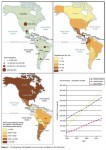
Contemporary Human Geography
The territory of the Americas is demarcated into some 22 sovereign nation states and one overseas territory, Guyane (French Guiana). The geographical size, population, economic clout, and role in the world political system of these nation states, varies tremendously. The United States, as one of the world's most powerful nation states, is both the region's most populous nation, with close […]
Cultural Commonalities
Although the human geography of the Americas is sometimes described as diverse, in fact the peoples of this region share many common cultural characteristics. These include similar colonial histories, cultural orientation, religious traditions, political values and systems, and economic organization. With the exception of Aus tralia, the contemporary human geography of the Americas is one of the least varied in the […]
Human Antecedents
Prior to the arrival of Europeans and their colonization of the Americas at the beginning in the early sixteenth century, Amerindian peoples had occupied much of the Americas for at least 10 000 years. The level of social and economic development among these peoples varied tremendously. Pre agricultural societies dependent on hunting and gathering, early agricultural communities, and highly developed advanced […]
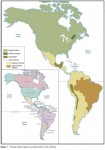
Regional Perspectives
Conceptually, the Americas can be subdivided into subregions using distinct criteria. From an environmental or geographical perspective, it is often divided into three macro divisions – the continental landmasses of North America and South America, and the small narrow landbridge, Central America, which joins the two continents. The human geography of the region is better understood and conceptualized differently. At […]
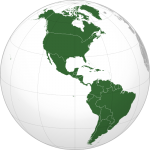
Americas
The Americas is an immense geographical region spanning two continents, North and South America, and includes the islands of the Caribbean Basin. While the Caribbean Basin is a part of the Americas, that subregion is covered elsewhere in this encyclopedia. The Americas lies fully within the Western Hemisphere. The region spans nearly 1501 of longitude extending from the eastern […]
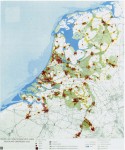
Few Examples of Territorial Development Policies
Netherlands It has already been said that Netherlands practiced territorial development before this expression was used. However, it has not been before 1962 that an act instituted territorial plans at the national scale. There has been, up to now, five such plans, plus revisions of some of them. This means that it is an evolutive planning, indicating priorities […]
The Five Great Dilemmas of Territorial Development
Territorial development is at the heart of many conflicts between objectives. Economic Development versus Territorial Equality The ordered disposition sought by territorial development does not necessarily correspond to an economic optimum, which would suppose a priority development of settlements and regions already favored by their localization, their assets in terms of manpower, image, etc. Territorial development, on the contrary, has, among […]
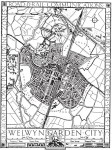
First Experiments
Netherlands: Struggle against the Sea Due to the exiguity of their territory (now 34 000 km2 for 16 million inhabitants) and to the permanent menace of maritime invasions (a large part of the territory is below sea level), Netherlands had a practice of territorial development of polders since the twelfth century, before the term existed. This country, which has been […]
Which Scientific Status for Territorial Development?
Amenagement du territoire (territorial development) cannot be considered as a science, which is a coherent ensemble of knowledge based on specific concepts and on theories and developing rules proved either by a rigorous demonstration or by experimentation. It can no more be qualified of being a technique, that is a savoir faire, a set of processes, of means, and […]
What Is Amenagement du Territoire or Territorial Development?
We suggest the following definition of Amenagement du territoire (territorial development): action and practice (rather than science, technique, or art) of disposing with order, through the space of a country and in a prospective vision, people and its activities, amenities, and means of communication they can use, taking in consideration natural, human, and economic (and even strategic) constraints in order that […]
Amenagement du Territoire: Territorial Development
It can be considered neither as a science nor as a technique, or as an art, but as a voluntary intervention or as the territorial aspect of planning. Therefore, it is a praxis (a set of actions aiming to the same objective) and a practice. It is fed less with theoretical rules or savoir faire than with empiricism. Therefore, […]
Aid
Different Types of Aid Reasons for Giving Aid Changing Trends in Development Aid Aid Conditionality Humanitarian Aid Critical Contemporary Aid Debates
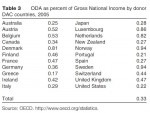
Critical Contemporary Aid Debates
Many critics have doubted the effectiveness of aid especially in the context of reducing poverty. Throughout the 1970s, the dependency theorists viewed aid as a source of exploitation and dominance by the northern countries. In the 1980s, ODA was challenged by the rise of the neoliberal agenda in the west as aid was now held to contribute to excessive government […]
Humanitarian Aid
Since the early 1990s, there has been both an increase in the number of disasters and a change in the nature of emergencies leading to a substantial increase in humanitarian assistance. Emergencies have changed in nature from mainly being natural disasters such as floods, famines, and droughts to complex emergencies such as the 'war on terror' post 11 September […]
Aid Conditionality
There was an increase in condition based lending in the 1980s based primarily on institutional reform and economic policies with strong neoliberal principles of market led development in developing countries. These economic conditions came to be known as the Washington Consensus. Recipient countries had to fulfill requirements such as structural adjustment programs (SAPS) which became a major feature […]
Changing Trends in Development Aid
In the early decades, development aid was given on an economic basis mainly to enhance productive capacity and bring about modernization of developing countries (influenced by modernization theories). Many developing countries in the initial phase of development, post decolonization, wanted to industrialize their econ omies. This led to imports of technologies (such as hybrid varieties of crops, fertilizers, imports of machinery, […]

Reasons for Giving Aid
The main objective of giving aid, since decolonization, is to eradicate poverty from developing countries. Although over the last 50 years other objectives have also emerged which influence donors. For example, around two thirds of Britain's aid has gone to Commonwealth countries to maintain close historical relationships. A has also been given to secure economic and political interests such as cheap labor, […]
Different Types of Aid
The main aim of aid (also known as 'official development assistance' – ODA) is to provide resources on concessional terms for the promotion of economic development and welfare in developing countries. Most often the transfer of these resources is in the form of grants and loans on concessional terms from the developed (mostly northern countries) to developing countries (mainly in the […]
Contested Models of Agri-Environmental Governance
At the same time, agri environmental concerns have been swept into an increasingly international debate about the broad nature of agricultural sustainability and the role of farmers in delivering this. The restructuring and relocation of production that is likely within an increasingly globalized agro food system may prove as damaging to habitats and landscapes as earlier periods of agricultural change and […]
Toward Greener Farm Policies?
The idea that farmers deserve special treatment because they are farmers was never likely to be defensible as a long term justification for state assistance. Policymakers have presented public good and social equity justifications for shielding farmers from world market forces for many decades, but it was not until the late 1980s that an environmental public good rationale was articulated with […]
Developing an Environmentalist Critique of Modern Agriculture
Environmentalist critiques of modern farming first emerged in places like Western Europe, the United States, and Canada during the late 1970s. Mounting evidence of the biodiversity, soil erosion, and off farm pollution impacts of agricultural intensification and specialization was brought to public attention by campaigning scientists and journalists and by conservation groups in both the EU and North America. In the […]
Agri-Environmentalism and Rural Change
The realization that modern, intensive agriculture could be environmentally damaging was slow to gain ground among policy elites in industrialized countries. Traditionally portrayed as environmental stewards engaged in the production of essential staples, farmers in most developed countries since the 1930s have received substantial levels of government support in order to achieve food security and public good policy goals. […]
Conclusions: Prospects and Challenges for Sustainable Agricultural and Rural Development
This article started by outlining some of the basic and time honored principles of sustainable agriculture. The proceeding synthesis, concerning the variant ways and vectors in which these principles have been (contestedly) grounded and conceptually developed by scholars, has demonstrated their continual and growing relevance. For much of the latter half of the twentieth century agricultural sustainability debates concentrated on both […]
Some Conceptual Building Blocks for the Sustainable Rural Development Paradigm
One common mistake about the new rural development paradigm (within the contemporary European context, at least) is to assume that it is simply a return to localism, and/or that it falls victim to the 'local trap' in general sustainability literatures. This assumes that there is an unproblematic set of elisions between the local embeddedness and overall sustainability. It is important to correct […]
The Sustainable Rural Development Paradigm in Europe
Since the 1990s a fledgling, sustainable rural development model has been emerging, at least in a European context which has incorporated many of the principles of sustainable agriculture, specifically, agroecology. While building upon the multifunctional assumptions, but also adapting many of the agroecological principles developed in Southern countries, this model attempts to reintegrate agriculture as a multifunctional set of practices. […]
Agroecology and Ecological Modernization Perspectives
A particularly forceful oppositional response to the conventionalizing and entropy maximizing features of the agri industrial system has been the growth and salience of agroecological approaches. Agroecology emerged in the 1980s as an important attempt to establish a natural and social scientific basis for alternatives to industrialized agriculture which attempted to avoid its resource degrading tendencies. Agroecological frameworks draw upon […]
Widening and Grounding Key Principles and Concepts
Up until the 1970s the agri industrial model, which had been superimposed upon much of the advanced world both in its capitalist and state socialist variants, had managed to control and legitimize itself concerning its longevity and general societal acceptance. It was as if the ideology of growth, specialization, intensity, mechanization, and increasing yields were to be never ending. From that […]
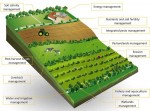
Agriculture, Sustainable
High-Level Conceptualizations: Some Foundation Principles Since the 1960s the concept of sustainable agriculture has been increasingly used to denote a variable but significant rupture with what has been termed the more dominant agri industrial model of agriculture and rural development. In general terms it can be defined as referring to the environmental or ecological soundness of the agricultural production processes or […]
Oceans of Conflict and Imagination
Overriding these turns to the ocean across the various subdisciplines of human geography are two increasingly prevalent geographies of the ocean: the construction of the ocean as a site of conflict and its construction as a space of imagination. The rise of the ocean as a site of conflict is a direct result of its dominant management paradigm, wherein specific zones […]
Economic Geographies of the Sea
Finally, economic geographers as well are beginning to direct their attention to the ocean. Countless local and national economies are driven by the tourism sector and, within the tourism sector, a wide range of activities involve tourists embracing the ocean, whether from the shore, a ship, the surface, or beneath the waves. Economic gain is also constructed in the ocean […]
Environmental Geographies of the Sea
Just as historically there has been little cultural geography of the sea, similarly few human geographers until recently have focused on the ocean as a space of nature. To some extent, this likely is because, until recently, it was believed that humans could do little to influence the condition of the marine environment or the status of marine resources. Prior […]
Cultural Geographies of the Sea
While contemporary studies of the political geography of the sea can draw upon a long history of political geographers studying maritime conflict, the study of marine issues is quite new in cultural geography. Of course, there always have been marine cultural geographies; seafaring and fishing communities invariably display distinct cultural formations that reflect and impact the surroundingmarine environment. Historically, […]